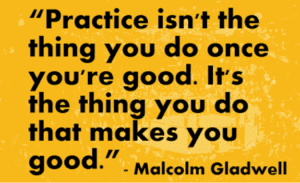I am sure whether you have worked in dentistry for a short time or you have had a long career in the industry, you have come across at least one team member (perhaps many) that have uttered the words, “But I already KNOW how to do all of this stuff!”
This attitude is dangerous when it pertains to training for front office tasks, and especially when it comes to phone verbal skills.
Is “Just OK” ok?
Nearly every day we chat with a dentist and hear, “Well, my team is good on the phones. They tell me they already know the stuff that I want to teach them.”
My response is pretty consistent. “First of all, you are a dentist and I assume you KNOW how to do a filling, crowns, exams, etc., but does that exempt you from doing CE every year?” The dentists always say, “No, of course not.”
Also, the same dentists that tell us they think the team members are pretty good and much better than other offices, also admit that when they listen in on phone conversations between their team member and patients, they cringe at some of the things their team members say.
If cringing while listening to your team is your idea of good, you should hear the terrible offices! That is not an All-Star office… that isn’t even an excellent office. That’s sub-par at best.
Now, what if we flipped the tables and asked dentists if they think its “ok” to be a sub-par clinician? How would it work out if a patient asked you about the quality of your dentistry and you told them you were “ok” or “pretty good?” I am sure you hold yourself to a much higher standard than that!
What’s your standard?
Next, let’s go back to that little statement about how they “already know how to do all of this stuff.” I know how to pick up a tennis racket and hit a ball. I can read about it, I can watch videos and online tutorials year-after-year, I can even go outside and hit the ball a few times, but that doesn’t make me good at it. You see there is a vast difference between knowing how to do something, doing it, and doing it well.
I can know how to do something. I can even do it. But just “doing it” doesn’t mean I am doing it well. Often, someone who has been doing a specific task or activity for a long time may not necessarily have been doing that task well – and not even KNOW that they are not performing to their potential. And their “experience” (and misplaced confidence in their skills) can make it much more difficult for them to change their approach. They may not even want to do anything differently because “different” is uncomfortable.
We might think, well, they are at least scheduling appointments and converting some phone calls, so why rock the boat?
A real measure of patient success
First, the average conversion rate for team members is around 35%. That means two-thirds of new patient opportunities are going to waste.
Second, converting some calls to appointments is great, BUT, if they are not doing using a specific service-based process then the call will usually sound very transactional. That means it’s a boring, non-connection-based conversation that you could experience with any hum-drum business. If the team member did nothing to build rapport with the caller, even if they converted the call to an appointment, there is a very good chance that this patient and others like them will not keep the appointment, and not stay a long-term patient.
I am always curious to see not just how many new patients an office is converting each month but most importantly how many are coming in to their appointment, becoming a regular patient of record, accepting treatment, and referring friends and family.
Overcoming habits
Sometimes habits are so ingrained in our personal identity that changing those habits can feel like we are losing ourselves – the process can be very scary. For most, it’s easier to repeat what we have been doing rather than changing and not knowing what to expect.
But, if you truly want to see improvement, that means stepping into the unknown and getting a little uncomfortable. It can mean the Dentist talking to their team about expectations for the office and the level of verbal skills and customer service that is not only recommended but expected.
However, you cannot simply state your expectations for your team members and then sit back and not be involved. This is the tricky part for dentists. Many dentists have to learn to embrace change and let go of the fear of having team members push back or get upset. Learning to become a better leader will help you navigate the more difficult discussions with your team members. Focus on positive feedback that the team can use to help improve their skills and not get stuck in fear, or resentment.
In order to do provide the best guidance to your team, you need to set clear expectations of what you want and how they can achieve those goals. Be sure to praise their success in public and discuss areas still needing improvement in private.
A formal system for feedback, like progress reports or performance reviews, can help the team understand their strengths and areas to continue work. Without this feedback, the team member might feel like they are doing a good job but not be aware there are areas that still need improvement.
Practice, practice, practice
Also, take time each week to practice, role play, and listen to a team member’s patient calls together. This process will help them learn to be more comfortable with what they say on the phone with potential patients. It will also build awareness of how they sound – this is a powerful way to improve. Yes, it can be awkward to get graded on a call, and sometimes even just listening to your own voice on a call can be embarrassing at first, but over time, as they start to see improvement, they will get excited at their progress.
So to summarize:
- Just because someone has been doing something for a long time does not mean they are an expert
- There is a big difference between knowing something, doing it, and doing it well
- Just converting calls to new patients is not a full measure of success without knowing if they are showing up, accepting treatment, and referring friends and family
- The Dentist must be the leader and set the standard and expectations for training.
- Praise in public and give feedback on improvements in private
- Conduct regular performance reviews to go over feedback, expectations, and benchmarks of success
- Practice and role play together!
- Listen to calls with the team members so they get used to the feedback process and it becomes more comfortable
And remember, even if the training process seems like something you already know, there is always more fine tuning that can be done. Think of the best professionals in every sport, industry, or field. They are always going back to the basics. Think of professional basketball players… yes, they practice fancy plays but in each and every practice they still work on their layups, their free throws, etc… Practice in whatever you do!

***
Get more details on how All-Star Dental Academy’s Phone Success training program can supercharge your phones by visiting our Services page. Alternatively, you can learn about how front office performance on the phones can lead to success: register for our free educational webinar Dental Practice Excellence: 3 Steps to an All-Star Practice. Finally, you can call our office at (844) 631.7575 to speak with an All-Star representative about our Training Program.









